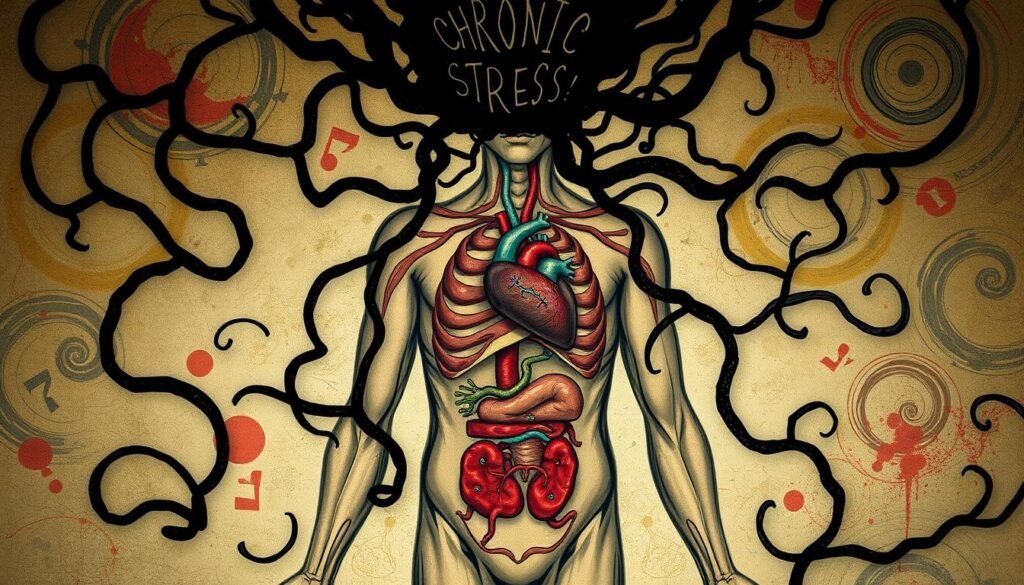Did you know that chronic stress is linked to over 75% of all health care visits in the United States? This surprising fact shows how much stress affects our lives. It leads to health issues like anxiety, depression, heart disease, and stomach problems. As the challenges in life grow, whether from work, money issues, or health scares, many people find themselves trapped in ongoing stress. This stress messes with nearly all bodily functions.
It’s important to know when you’re dealing with long-lasting stress to keep yourself healthy. By using good strategies to handle stress, people can improve their life quality. We’ll look at how chronic stress hurts our bodies and minds. We’ll also talk about the importance of understanding stress and what you can do to manage it well.
Key Takeaways
- Chronic stress affects over 75% of U.S. health care visits.
- It can lead to numerous health problems, including depression and heart disease.
- The stress response system can be disrupted by long-term stress exposure.
- Identifying and managing stressors is vital for overall health.
- Effective stress management improves quality of life and relationships.
- Healthy coping mechanisms can enhance emotional well-being.
The Nature of Stress: A Natural Response
Stress is a basic natural stress response that helps protect us from dangers. When we face a problem, our bodies release hormones such as adrenaline and cortisol. This makes us more alert and ready to act quickly in stress and survival situations.
Many things in life cause stress. Long ago, these responses helped us survive real threats. But now, stress comes from job issues, relationship problems, and too many duties. These modern stresses can keep us tense all the time, hurting both our minds and bodies.
Being stressed for a long time can lead to serious health troubles. This includes heart disease, anxiety, and depression. For example, studies show that being very stressed when young can make anxiety and mood problems more likely later. It’s important to find good ways to manage stress relief.
Stress affects everyone differently. Some might feel worried, tired, have a fast heartbeat, or stomach issues. Knowing about stress and how to relieve it can make us healthier and happier.
For extra information on stress and health, check out this in-depth article at stress and its health implications.
Understanding the Stress Response System
When we sense danger, our body’s stress response system kicks in. The hypothalamus sends an alarm, triggering the fight-or-flight response. This leads to hormones like adrenaline and cortisol being released. Adrenaline ramps up heart rate and energy levels. On the other hand, cortisol boosts blood sugar, prepping the body for action.
Normally, hormone levels drop once the threat is gone, helping the body relax. But if stress keeps happening, these hormone levels stay high. This can hurt our health over time. Being under constant stress can cause many health problems. That’s why knowing how to manage stress is key.
It’s critical to understand the stress response system’s workings for our health. Research shows that stress has a big effect on our lives and health in the long run. To learn more about stress symptoms and how to handle them, check out Mayo Clinic.
| Hormone | Function | Impact of Chronic Stress |
|---|---|---|
| Adrenaline | Increases heart rate and energy | Can lead to high blood pressure and heart problems |
| Cortisol | Increases blood sugar, suppresses immune system | May result in diabetes and weakened immune response |
The Physical and Emotional Toll of Prolonged Stress
Prolonged stress seriously affects our bodies and minds. It can lead to many health problems that need immediate care. Knowing how stress impacts us can help us find ways to handle it better.
Physical Health Impacts
Stress can harm your body in many ways. It’s been linked to big health issues such as:
- Cardiovascular diseases, including hypertension and heart disease
- Compromised immune function, increasing susceptibility to infections
- Digestive issues, leading to problems like irritable bowel syndrome
- Chronic pain and tension headaches
- Diabetes and obesity due to poor lifestyle choices influenced by stress
Nearly 70% of people with serious health problems are dealing with chronic stress. This stress can make health issues worse, making it important to take care of your body.
Emotional and Mental Health Effects
Stress can really hurt your emotional well-being. You might experience:
- Anxiety and panic attacks
- Depression, characterized by feelings of worthlessness and hopelessness
- Difficulties in concentration and decision-making
- Irritability and behavioral changes, such as withdrawal from social activities
Chronic stress can damage your mental health. Studies show that stress plays a big role in almost 80% of human disorders. Managing emotional health is key to lessening these negative effects.
| Health Impacts | Physical Effects | Emotional Effects |
|---|---|---|
| Cardiovascular Health | Hypertension, heart disease | Increased anxiety |
| Immune Function | Increased illness risk, delayed healing | Feelings of isolation |
| Weight Management | Obesity, diabetes | Depressive symptoms |
| Mental Clarity | Pain, digestive issues | Difficulty in concentration |
It’s vital to address both physical and emotional stress impacts for better health. Developing strong coping skills can help reduce health risks and improve your well-being.
Chronic Stress: A Deeper Look
Chronic stress happens when stressors don’t go away for a long time. It can lead to many health problems. It greatly affects our mental and physical health. Symptoms include feeling tired, getting easily upset, headaches, and not sleeping well. It’s important to recognize these signs to manage stress better.
Long-term stress can harm how we think, remember, and learn. Studies show that too much cortisol, the stress hormone, can change the brain. These changes could relate to memory problems. It shows how ongoing stress can hurt our brain health.
Work problems, money worries, and issues in relationships often cause chronic stress. Job stress comes from too much pressure and conflicts. Money problems keep us in a constant worry, affecting our health.

Chronic stress can lead to serious emotional problems like anxiety, mood changes, and PTSD. Dealing with stress symptoms early can stop them from getting worse. Using mindfulness, staying healthy, and having a good support network can greatly help.
Challenges of Identifying Stressors
It can be tough to pinpoint what’s causing stress today. We often face many problems at once, making it hard to find the main cause. It’s key to figure out what’s stressing you out to handle it well and stay healthy.
Common Sources of Stress
Many things can make us feel stressed in our daily lives. Some common ones are:
- Work obligations, including demanding deadlines and challenging bosses
- Personal relationships with family and friends
- Financial issues such as debt and job insecurity
- Health-related concerns, including chronic illness and medical conditions
- Traumatic experiences, such as accidents or natural disasters
Individual Perception of Stress
How we view stress matters a lot. What stresses one person might not bother another. This difference affects how we deal with stress. Understanding this can help us find better ways to manage stress.
The Link Between Stress and Chronic Health Issues
Many studies show a link between chronic stress and health problems. Stress can lead to long-term health issues. These can hurt how well you feel overall.
Cardiovascular Health Risks
Chronic stress can make heart disease more likely. It can cause a quicker heartbeat and higher blood pressure. Both are bad for your heart.
People under a lot of stress might eat poorly and not exercise. This can make heart risks even worse.
Impact on Immune Function
Stress takes a toll on the immune system. Being stressed all the time makes you more likely to get sick. It messes with how well your body can fight off diseases.
Mental Health Disorders
Chronic stress is linked to anxiety and depression. It affects brain chemicals, leading to tough emotional issues. Stress can also mess with your memory and sleep, causing insomnia or sleep problems.
It’s vital to tackle stress. If you’re looking to boost adrenal health through diet, making informed lifestyle changes is key. This can help deal with these chronic health issues.

Strategies for Effective Stress Management
Managing stress well is key for staying healthy. There are many ways to tackle life’s stressors effectively.
- Regular physical activity is a big stress-buster. Aim for at least 2 ½ hours of exercise a week for better emotional health.
- Getting enough sleep, 7 hours or more, is crucial for stress and burnout prevention.
- Eating a diet full of key nutrients helps your body handle stress. It’s good for stress and overall health.
- Techniques like deep breathing and mindfulness can lessen stress and anxiety.
- Having a daily plan and organizing tasks can reduce feeling overwhelmed and make you more productive.
- Good coping skills, like hobbies or spending time with friends, are great for stress relief.
- Being aware of what stresses you can lead to better stress management through changes in lifestyle or behavior.
- During tough times, professional counseling can offer strong support and new ways to handle stress.
Using these strategies every day can arm you with the tools to fight stress. Support from loved ones is also key in bouncing back from stress. Sticking with these methods can help avoid stress-related health problems, leading to a healthier way of life.
| Stress Management Strategy | Description | Benefits |
|---|---|---|
| Physical Activity | Regular exercise, at least 2 ½ hours weekly. | Reduces stress levels, improves mood. |
| Sleep Hygiene | Aim for 7+ hours of restful sleep each night. | Enhances resilience to stress, improves cognitive function. |
| Balanced Diet | Incorporate a variety of nutrients in daily meals. | Supports physical health during stress, boosts energy. |
| Mindfulness Techniques | Engage in meditation and relaxation exercises. | Reduces anxiety, improves focus and emotional regulation. |
| Organizational Skills | Structure daily routines and prioritize tasks. | Decreases feelings of overwhelm, increases productivity. |
| Social Support | Maintain connections with friends and family. | Enhances resilience, provides emotional relief. |
| Professional Help | Seek counseling for targeted support. | Offers tailored strategies for individual stressors. |
Mindfulness Techniques for Stress Reduction
Mindfulness helps people deal with stress better. It teaches us to focus on the present. This way, we let go of stress and find emotional peace. Relaxation methods like meditation and deep breathing calm the body. They slow down the heart rate and lower blood pressure, making us feel less stressed.
Research shows that mindfulness makes us mentally stronger. A study in the Journal of Research in Personality found it makes us better at handling stress. The Centers for Disease Control says 66% of American workers lose sleep because of stress. This shows how important mindfulness is for our mental health.
There are different meditation methods to practice mindfulness. You can try guided meditation, mantra meditation, or mindfulness meditation anywhere. Techniques like deep breaths, body scans, and loving-kindness meditation also help reduce stress.
Mindfulness can improve our mental health by lowering anxiety and depression. It might also help our physical health by boosting our immune system and helping us recover from sickness faster. Making mindfulness a part of our daily life can change how we manage stress for the better.
The Importance of Work-Life Balance
Achieving a healthy work-life balance is crucial in today’s fast-paced world. More than half of employees worldwide find balancing work and home life tough. This struggle can cause anxiety, depression, and chronic health issues. In 2020, overwork resulted in over 745,000 deaths, showing the need to manage work-related stress.
A good work-life balance improves overall well-being. Setting clear boundaries between work and personal time lowers stress. It also helps avoid burnout in personal and professional lives. This balance leads to better mental health. It can reduce chronic pain, hypertension, and digestive problems.
Well-rested employees handle their workloads better. They can meet personal and professional demands more efficiently. This approach boosts satisfaction and productivity. Flexible work schedules have been shown to increase productivity and loyalty. Taking regular breaks also helps in stress management and making smarter choices.
- Effective communication is key to lowering stress and better problem-solving.
- Regular exercise fights stress, depression, and anxiety, providing strong coping mechanisms.
- Listening to music at work can spark creativity and reduce stress and anxiety.
Offering care for dependents and more remote work options are vital for a healthy work-life balance. Today, over one in four Americans say they are “super stressed.” This fact highlights the need for strategies to reduce stress and protect mental health. People with strong support systems have better immunity, showing the importance of nurturing relationships.
| Impact of Work-Life Balance | Positive Outcomes |
|---|---|
| Reduced stress levels | Prevention of burnout |
| Better mental health | Minimized risks of chronic pain |
| Increased productivity | Enhanced employee loyalty |
| Effective stress management | Improved decision-making |
By embracing work-life balance improvements, both people and companies win. They enjoy more productivity, better mental health, and less stress. Clearly, handling stress at work is key to a successful work environment.
Self-Care Practices to Counteract Stress
Adding self-care to daily life can really help fight stress. Regular exercise boosts your mood and health. Just two days a week of aerobic activity can make you feel less stressed. This is especially true during uncertain times. Eating well is also key for stress management. A diet with lean proteins, complex carbs, and healthy fats helps your body handle stress better.
Exercise and Nutrition
Working out is great for knocking out stress. It makes your body release endorphins, which make you happy. Eating foods full of antioxidants, like fruits, veggies, and spices, helps protect your cells from stress. People who take care of themselves tend to feel less stressed. But, eating a lot of processed foods can make you more stressed out. Just 20-30 minutes of exercise a week can make a big difference in how you feel.
Engaging in Hobbies
Hobbies like gardening, reading, or making art help relax your mind. Spending time on things you love can keep anxiety away. Being with friends and family can also help you cope better with stress. Making time for hobbies lets you step away from daily stress. This is good for your emotional health.

Choosing self-care activities that fit you is important. This way, you can find what really helps your mental health. Balancing work, personal time, and self-care is key for dealing with stress. To learn more about ways to reduce stress, check out this resource.
Conclusion
Today’s fast-paced world can take a heavy toll on our health. Stress can lead to serious health issues like heart disease and mental health challenges. It’s important to know this link and work on stress management.
Self-care is a powerful way to fight stress. Activities like exercise and eating well help a lot. They not only make you feel better right away but also protect your health long-term.
Techniques such as mindfulness and good nutrition are vital. They help lessen stress’s impact. Considering therapies like cognitive-behavioral therapy can also be beneficial.
Handling stress well is crucial for a better life. It improves both your physical and mental health. With the right steps, everyone can enjoy a more fulfilling life with less stress.